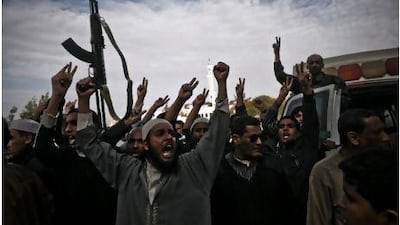WASHINGTON // The uprising in Libya shows signs of settling into a drawn-out conflict resembling African civil wars more than it does recent Arab uprisings, according to military analysts.
Muammar Qaddafi, the Libyan leader, remained defiant yesterday, even though large swathes of the country are out of his control. In a televised speech from his stronghold in Tripoli, Colonel Qaddafi warned the West against intervening to support the rebellion against him, saying that would unleash a "very bloody war" in which "thousands of Libyans would die."
The opposition has garnered international support in the form of sanctions targeting Colonel Qaddafi and his immediate family and close advisers, an embargo on arms sales and an unprecedented unanimous vote in the UN's Security Council to refer the Libyan regime to the International Criminal Court. On Tuesday, Libya also was suspended from its seat on the UN Human Rights Council.
Opposition forces are now urging the international community to go a step further and impose a no-fly zone over the country, to prevent Colonel Qaddafi from launching air raids against his own people.
But such a move does not seem imminent. Robert Gates, the US secretary of defence, on Tuesday told reporters that while a range of options was being discussed at the Pentagon, the UN's Security Council had not sanctioned any direct military intervention and any such action would "need to be considered very carefully".
The Arab League said yesterday it would consider backing a no-fly zone over Libya to end the regime's crackdown on rebels, but ruled out supporting any direct foreign military intervention. "The Arab countries cannot remain with their arms folded when the blood of the brotherly Libyan people is being shed," the league said in a resolution after a meeting of foreign ministers in Cairo.
Without Arab involvement, any military intervention would be difficult said Michael O'Hanlon, a national security and defence specialist with the Washington-based Brookings Institution.
It would not be desirable for Nato to go it alone, Mr O'Hanlon suggested, without the diplomatic and military involvement of countries in the region, including the Organisation of the Islamic Conference. "You don't, anymore, want white people killing Arabs."
Without foreign intervention, however, it is likely that the conflict will be protracted.
Mr O'Hanlon said that much analysis on the Libyan situation had centred on its similarities to uprisings in Tunisia and Egypt, where massive popular demonstrations forced leaders out after a few weeks. He suggested, however, that the Libyan outcome might more aptly compare to conflicts farther south, including in the Ivory Coast, where a civil war has been fought intermittently since 2002.
While precise figures for the size of the opposing forces in Libya are hard to come by, rough estimates say that they are about equal.
Mr O'Hanlon and Nathan Hughes, director of military analysis at Stratfor, a Texas-based global intelligence company, both suggested that the opposing sides might each be able to count on some 10,000 troops.
Those figures tally with statistics compiled by IHS Jane's Country Risk, part of the Jane's Information Group of publications specialised in security matters.
Jane's lists units loyal to Colonel Qaddafi as including the Revolutionary Guards, the Jamhariya Security Organisation and the Military Secret Service.
The concentration of regime loyalists in non-combat units suggests, it has been reported, that Colonel Qaddafi, who came to power in an army coup, has followed a strategy of weakening and dividing the army to prevent any coup against him.
The Libyan military is equipped with largely Russian weaponry, from MiG fighters to T-54 and T-55 battle tanks. But it is not clear how many of these are serviceable.
On the books, the air force has more than 200 planes, but Jane's statistics suggest at least a third are out of service. Moreover, half the army is conscripted, Mr Hughes said, pointing out the defections already reported. "There's not necessarily a lot of loyalty as the situation comes apart."
Another factor, Mr Hughes said, is geography. Libya has essentially divided into western and eastern parts, separated by a desert.
"There's already a huge buffer between the opposition in the east and Qaddafi in the west, and it's going to be difficult for either side to move a meaningful amount of military force across that open expanse," Mr Hughes said.
With the sides entrenched in separate parts of the country, and no sign of international intervention, the conflict could drag out, Mr Hughes suggested.
The Libyan air force would not be able to neutralise the opposition in the east on its own, Mr Hughes said, even without a no-fly zone, and so the conflict could lead to a "stalemate".

